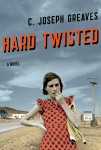Hard Twisted by C. Joseph Greaves
The true events behind the John’s Canyon Murder and the subsequent “skeleton murder trial” of the Depression Era are brought to spellbinding light in HARD TWISTED, set in a landscape as brutal as it is beautiful. After a twelve-year quest, trial lawyer C. Joseph Greaves gave up his thriving partnership to write a saga of survival, redemption and a young girl’s coming of age. Oklahoma May 1934 — Clint Palmer, released from the federal penitentiary in Leavenworth, Kansas , befriends Dillard Garrett, a homeless man and his 13-year-old daughter, Lucille. Palmer lures them to Texas, where Dillard Garrett mysteriously disappears. Lucile begins a harrowing, year-long ordeal in captivity culminating in four additional killings.
Charles Joseph Greaves spent 25 years as an L.A. trial lawyer before turning his talents to fiction. His award-winning debut novel HUSH MONEY was hailed by critics as “an auspicious debut” (KIRKUS REVIEWS, Critics’ Pick) and a “stellar first novel” (PUBLISHERS WEEKLY, starred review) and a “delightful debut” (LIBRARY JOURNAL, starred review).
His second novel, HARD TWISTED, is the result of a twelve year determined search for the truth behind the John’s Canyon murders of 1934. An expected literary masterpiece, while in manuscript form, it was named the Best Historical Novel of 2010 in the SouthWest Writers’ international writing contest.
Belief in himself, in his writing, and support from his saintly wife Linda, propelled this formidable horseman and marathon runner to give up a thriving Pasadena law partnership for a decade long search for the truth. It resulted in the brilliant start of a literary career. Now settled in Santa Fe, Charles Joseph Greaves, a marathon runner and an accomplished horseman, writes full-time, and tends his vineyard.
In the following interview he shares with ITW readers the why, what, and how of his writing, and some of his personal life.
Could you just introduce yourself to our readers please?
I’m a second-career novelist, having spent 25 years as an L.A. trial lawyer before taking the leap, head-first, into fiction. I resigned my law partnership in 2006 and immediately began writing HUSH MONEY, a legal thriller. I then wrote HARD TWISTED, a literary/historical novel based on a true crime, and entered both manuscripts in the SouthWest Writers’ International Writing Contest in 2010. Out of 680 entries that year, HARD TWISTED came in second and HUSH MONEY came in first. Within four months of winning that contest I had an agent, a multi-book deal with Minotaur (for HUSH MONEY and it sequels) and a separate deal with Bloomsbury for my literary fiction, beginning with HARD TWISTED. I’ve been very, very fortunate.
You wrote HUSH MONEY as Chuck Greaves, but HARD TWISTED as C. Joseph Greaves. What influenced the change of author name, and whose decision was it?
This was purely a publishers’ decision. Both, I think, wanted to avoid any reader confusion attendant to the fact that the Jack MacTaggart legal mysteries (starting with HUSH MONEY) are snappy page-turners, while HARD TWISTED is fairly dense and gritty. I resisted their initial suggestion that I adopt a nom de plume, and so we all compromised on variations of my full name, which is Charles Joseph Greaves.
Was resigning a 20-year law partnership in a prestigious firm to write full-time a childhood dream fighting middle age, the calculated decision of a trial lawyer, an overwhelming need to share your vision of redemption, a wild impulse, or something else?
It was temporary insanity, brought on by my 50th birthday. All’s well that ends well, but believe me when I tell you that there were some dark days in 2008-2009. Writing full-time without a contract is an exercise in blind faith, but I always had faith in the remarkable story behind HARD TWISTED – that if I executed the novel, it would find an audience – and that faith has been rewarded.
How did your family react to this decision?
My wife is a saint. Full stop.
What influenced the choice of settling in Santa Fe to the exclusion of all other places away from Pasadena?
We moved to Santa Fe for its beauty and cultural diversity, but also because the disparity in housing prices allowed me a few years of breathing space in which to write full time.
To what extent did your experience of preparing cases and arguing them help you with narrative focus?
I have a theory about that. I’ve noticed that among authors I’ve met at conferences, three professions are disproportionately represented: law, journalism, and advertising. All depend for their successful execution on a reductive process – on taking a complex fact pattern or concept and reducing it into something that’s digestible. As a lawyer, for example, I often had to make complex arguments within strict page limits. That is excellent training for writing fiction.
The narrative time of HARD TWISTED is the Great Depression under President Roosevelt, and the current recession on President Obama’s watch is causing much depression. Had the current recession kicked in at the time you decided to write this fascinating story?
The seeds that would bloom into HARD TWISTED were planted in 1994, when my wife and I were hiking in a remote red-rock canyon in southern Utah and stumbled upon a pair of human skulls. I spent over 12 years researching how those skulls had gotten there, and as the story unfolded in all its gut-wrenching majesty, I knew (a) that this was a novel, and (b) that someday I would write it.
Could economic conditions have an impact on the actions of people like Clint Palmer?
Clint Palmer was a psychopath. He was charismatic, cunning, and very focused on what he wanted, which was this young girl named Lottie Garrett whom he’d kidnapped after murdering her father. In the course of my research I acquired all of Palmer’s medical and psychiatric records. Were he alive today, we’d call him a pedophile and a serial killer. That the story takes place during the Great Depression, in one of America’s most remote and beautiful landscapes, only adds to the atmospheric and narrative frission.
To what extent was there an overlap — if at all — between the writing of HUSH MONEYand HARD TWISTED?
Temporally, very little – I finished HUSH MONEY before starting on HARD TWISTED. In experiential terms, however, I don’t think I’d have found my way to both novels without the background I have as a lawyer. HARD TWISTED begins and ends with Clint Palmer’s 1935 “skeleton murder” trial in Greenville, Texas, for the murder of Lottie’s father. (So-called because when they finally found Dillard Garrett’s remains and could not identify the victim, they placed the skeleton on display at the courthouse in Sulphur Springs, Texas.) The legal system is a unifying thread, I suppose, in all of my writing to date.
At what point in the writing of a book do you start planning out the next?
I treat my novels the way that, for example, a college basketball team might treat its games during the NCAA Tournament. You can’t look beyond the one at hand, or else you’re inviting trouble. I try to stay focused on what I’m writing. If a great idea should come to me while writing a book, and if I can’t use that idea in the book I’m writing, I’ll make a note and salt it away. I have a whole file full of those, but I don’t allow them distract me.
Under what conditions do you write best?
Alone, in the morning, with the door closed. I’ve never understood writers who work at Starbucks or who workshop their work-in-progress with friends. I’m of the Stephen King school in that regard.
Why have you focused on redemption as a theme linking your writing?
I don’t know that I’d put it quite that way. HUSH MONEY (and its first sequel, GREEN-EYED LADY) follows a traditional three-act narrative structure, so it ends – however unexpectedly – with a crime’s solution. That’s one kind of redemption. HARD TWISTED, on the other hand, came to me with its basic plot intact, and my challenge was to impose on the narrative some meaning or purpose that is greater than the sum of the characters’ actions. The fact that Lottie survived a year on the road with Clint Palmer, bore and lost his child, witnessed five murders, and yet found the courage in the end to testify against and convict him is a very different kind of redemption.
How do you spend your time when you’re not writing?
I try to finish my writing by around 2:00 or so each day. After that I tend a small vineyard (viognier and pinot noir), ride horses with my wife, run or bicycle, and enjoy a good meal, ideally from our garden, with a nice bottle of wine. We live pretty simply compared to our lives in L.A. And that’s a good thing.
*****
Researching an incident of social impact and resurrecting its mythologyas thrilling literature in the TRUE HISTORY OF THE KELLY GANG(2000) contributed to Peter Carey’s Booker prizes. In a different time-space, C. Joseph Greaves’ HARD TWISTED is in the same class.
 Unmitigated peer reviews focus on the full scope of HARD TWISTED.
Unmitigated peer reviews focus on the full scope of HARD TWISTED.
In the words of Bestselling UK crime fiction writer RJ Ellory, HARD TWISTED stands “shoulder-to-shoulder with Mailer, Capote and Berendt … McCarthy-esque non-fiction novelisation that is, at once, both timeless and classic.” Jonathan Evison, author of WEST OF HERE and THE REVISED FUNDAMENTALS OF CAREGIVING refers to Greaves’ as a “formidable storyteller and mean prose stylist that makes it look easy. … grit, suspense, pathos, and thrills.” VINCENT BUGLIOSI, author of HELTER SKELTER and AND THE SEA WILL TELL:”… fictional crime, with an exceptional true story as its spine, written in a superbly innovative way . . . compelling saga of murder, mystery, and good and evil at its rawest ….”
To learn more about Chuck, please visit his website.
- Dissection by Cristina LePort, MD - September 30, 2022
- Direct Legacy by James Stejskal - August 1, 2022
- Breaking Character by Mark T. Conard - May 2, 2022

